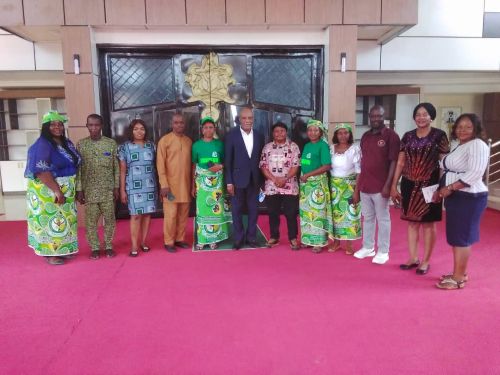The Ebonyi state House of Assembly Committee on Agriculture has explained the reason behind the low budgetary allocation to the sector in the state’s 2025 budget.
The Chairman of the House Committee, Hon. Onyebuchi Ogbadu, offered the explanation on Tuesday in Abakaliki, the Ebonyi State capital.
He spoke during an advocacy visit to his Committee by the Ebonyi State Budget Committee Group and Smallholder Women Farmers Organisation in Nigeria, Ebonyi State chapter.
The advocacy was powered by a Civil Society Organisation, Participatory Development Alternatives, under its Scale Up Public Investment in Agriculture project, with support from Actionaid, Nigeria.
The total Ebonyi State budget for the year 2025 is N444,978,000,000, with the agriculture sector having N6,572,020,000, representing 1.5 percent of the total budget.
Although the budgetary trend of the state for the past five years has been far below the 10 percent Maputu/Malabo declaration by African Heads of States, the 2025 budget is a drastic reduction from that of 2024, which stood at 4.1 percent.
This has remained a source of worry to most agriculture stakeholders in the state.
Ogbadu, who doubles as the Chairman of the State Committee on Nutrition and Food Security, noted that the issue was observed by the House during the budget defences but explained that the percentage reduction was to create a more balanced cross-sectoral development in the state in line with the People’s Charter of Needs Agenda of the Governor Francis Nwifuru-led administration.
He explained: “We noted that during our budget plenaries and defences, but in public finance management, for one sector to gain prominence, other sectors must suffer because it is based on ‘ceteris paribus.
“In 2024, agriculture took most of the other ministerial budgets because the state government had to pay off a backlog of up to five years, abandoned IFAD, FADAMA and other counterpart fundings, and took part of other ministries’ share of the budget.
Also Read:
- Tinubu to attend Pope Leo XIV’s inauguration in Rome
- Anambra: Police launch manhunt for suspected killers of lawyer, one other
- FCCPC dissociates self from illegal consumer protection company, seals premises
- Five in police net for allegedly stealing, selling two-week-old baby
- No casualty in Ifako Ijaiye General Hospital fire outbreak – CMD
“Those Ministries complained.
“And this year, there is the need for adjustment to move on.
“As it is now, having cleared the backlogs, FADAMA and other of such agencies have bounced back with renewed vigour in their agricultural support activities in the state, and the results are manifesting.
“The present government is trying to revitalise so many other abandoned sectors, including health, which was previously abandoned and neglected.
“This government based on the People’s Charter of Needs is taking all of them at once to create a more balanced sectoral development in the state, and I believe the results are obvious: massive foreign and local scholarships, improved human and material resources for health, among others.
“So, that percentage for agriculture is not a neglect of the sector.
“It is a deliberate economic balancing mechanism.
“However, we have noted your concerns, and we promise to give it the deserved legislative attention going forward.”
Ogbadu further noted that the present administration in the state has shown tremendous political will in improving agriculture and curbing food insecurity in the state through various interventions, including the revamping of the hitherto moribund state hatchery and poultry farm, the fertilizer blending plant and the feed mill industry, among others.
He also stressed that the Federal Government through the Renewed Hope Agenda of President Ahmed Tinubu is not resting on its oars in ensuring that agriculture takes its centre stage in the economy as a means of ensuring food security for the nation.
He assured that his committee would henceforth strictly monitor all Agricultural incentives, inputs and benefits accruing to the state from the Federal Government to ensure that they get to the real farmers in the state, including the smallholder women farmers, in their cooperatives.
Speaking earlier on their mission, the leader the group and Programme Officer, Participatory Development Alternatives, Ugochi Joseph, said they were in the Assembly to register the group’s dissatisfaction with the 1.5 percent 2025 Agricultural Budget, which she described as both infinitesimal and a drastic reduction from that of 2024 budget provision which was above four percent.
Joseph re-emphasised the need to declare a state of emergency in the sector to save the state from the prevalent national food crisis, and advocated for greater attention to be given to women farmers which according to her, constitute up to 80 percent of food producers in Nigeria.
Other team members who spoke at the event, including the State Coordinator, Smallholder Women Farmers Organisation in Nigeria, Andrena Okwor; Programme Manager, Initiative for Social Change in Africa, Lorieth Nwafor; Monitoring and Evaluation Officer of Development and Integrity Intervention Goal Foundation, Chimezie Ude; and a representative of the media, Oswald Agwu, drew the Committee’s attention to other areas of agricultural improvement, including access to inputs, credits and grants, monitoring and evaluation, research and technology as well as climate resilience and post harvest loss amelioration.
They urged the committee to integrate the SWOFON into the mainstream of agricultural development plans of the government and ensure through their oversight functions that budgeted funds for agricultural activities in the state are timely released.
In his remarks, the State House of Assembly Committee Vice Chairman on Agriculture, Hon. Stephen Orji Igwe, while appreciating the group, applauded the contribution of CSOs and media in development of the state and assured that the committee would continue to partner with them for greater impact.
The group, during the advocacy visit, presented some documented copies of the reviewed agriculture budget to the committee for further action.


